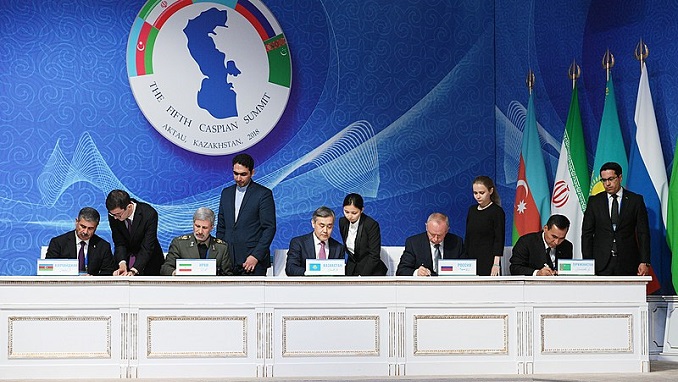In a bid to agree on how to divide the oil wealth of the region, five countries bordering the energy-rich Caspian Sea met Monday at an economic forum hosted by Turkmenistan, the Associated Press reported.
The first Caspian Economic Forum convened Sunday in Turkmenistan’s resort town of Awaza near the western port city of Turkmenbashi with Russian Prime Minister Dmitry Medvedev, Iranian Vice President Eshaq Jahangiri, Azerbaijani Prime Minister Nevruz Memmedov and Kazakh Prime Minister Askar Mamin attending alongside their respective delegations.
Turkmenistan’s President Gurbanguly Berdymukhamedov, who has wielded all-encompassing power since taking office in 2006, told the forum that the Caspian energy riches should provide a powerful incentive for the region’s development. It was Berdymukhamedov’s first public appearance since July 5, ending speculation about his health including death rumors.
Last year, the leaders of Russia, Iran, Azerbaijan, Turkmenistan and Kazakhstan signed a convention aimed at ending decades-long uncertainty over exploitation of its resources.
The agreement establishes rules for declaring each country’s territorial waters and fishing zones, but the issue of dividing seabed that contains rich oil and gas fields is subject to further negotiations.
Russia and Iran are yet to ratify last year’s agreement. Medvedev, who attended Monday’s forum, said that the ratification is expected “in the near future.”
Turkmenistan and Azerbaijan have yet to agree on how to share the reserves under the seabed. That has impeded progress of the Trans-Caspian natural gas pipeline that would carry Turkmen gas across the sea to Azerbaijan and further on to Western markets.
“It’s a very sensitive issue,” said Bahram Huseynov, a vice president of Azerbaijan’s state oil company SOCAR. “No concrete steps have been made yet and it’s too early to discuss specifics.”
The West has long encouraged prospective trans-Caspian pipelines as part of its efforts to diversify sources of energy, while Russia and Iran have watched the plans with unease.
More energy exports from the Caspian would compete with energy shipments from Russia, which has sought to expand the sales of its oil and gas to European markets.












